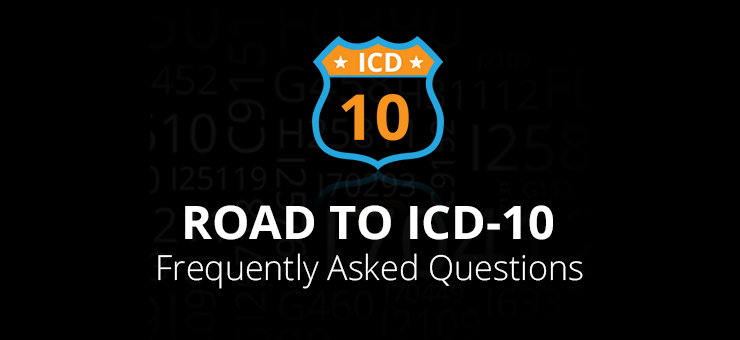In CureMD’s Road to ICD-10 series we received a number of questions from our participants- so many in fact that we decided to address them in a separate blog post. Read on to find answers to all your ICD-10 related queries. Don’t see an answer to your question? Post it in our comments section below and we will find an expert to answer them for you.
Does ICD-10 affect CPT codes?
The answer is no. The switch will not affect CPT coding for outpatient procedures. Like ICD-9 procedure codes, ICD-10-PCS codes are for hospital inpatient procedures only.
Will providers be able to use ICD-10-CM/PCS codes on claims prior to the October 1, 2015, implementation date?
No. ICD-10-CM/PCS codes may only be used for services provided on or after October 1, 2015. Claims containing ICD-10-CM/PCS codes for services provided prior to October 1, 2015, will be returned as unprocessable. You must submit claims for services provided prior to October 1, 2015, with the appropriate ICD-9-CM code.
What type of training will my staff and I need?
Each person in your practice will require some level of ICD-10 training. It is best to begin with designated experts in your practice. Once they are trained, they can teach the rest of your team. Physicians and coders/billers will need the most intensive training, clinical staff will need intermediate training, and front-office staff and schedules will require only a basic understanding. You will need to select what methods you intend to train your staff with, be it external, on-site, or online training.
Can I just use a mapping system such as GEM for ICD-10? Is there a cheat sheet I can refer too?
Many mapping tools do not drill deep enough for the fourth through seventh digits. Also, because there is not always a one-to-one mapping between ICD-9 and ICD-10, mapping tools cannot always provide the definitive code for a given situation.
We would not recommend using an external cheat sheet. A single ICD-9 code may have dozens – sometimes even hundreds- of possible ICD-10 equivalents. Your best bet is to create your own cheat sheet by identifying the ICD-9 codes you use most frequently in your practice and then determine their ICD-10 equivalent.
Workers comp and auto insurance payers will continue using ICD-9, even after the ICD-10 transition. Is that true?
To cut a long story short, that is correct. Workers comp and auto insurers are not HIPAA-covered entities. Thus, the national ICD-10 mandate does not apply to them. They can, therefore, choose to legally continue using ICD-9 post-October 1st. We don’t recommend relying on it for too long though. It seems that some states may require universal use of ICD-10 which will bind workers comp and auto insurance to make the switch as well. Moreover, leaders in healthcare –including CMS- are strongly advising these two entities to voluntarily begin using ICD-10 codes once the transition occurs. Thus, legally they are not bound but might make the switch anyway.
I run a cash-based practice. Should I be worried about ICD-10?
ICD-1O is truly a watershed moment for US healthcare. Even though you don’t deal with insurances your preparation for ICD-10 should be similar to practices that do. Chances are that some of your patient works directly with their insurance companies to get reimbursed for services you provide to them so it’s important for the codes on their invoices to be correct and as specific as possible.
What is the biggest change that ICD-10 will cause for providers?
Because ICD-10 codes are more specific than ICD-9 codes, to accurately code a diagnosis more specific documentation will be required. Many unspecified codes have been eliminated. Therefore, documentation processes currently used by providers will have to be revised to collect the appropriate information for ICD-10 diagnosis coding. We recommend you conduct a documentation gap analysis now and identify what is missing. For reference, focus on the following
- Disease type is not documented
- Disease acuity is not documented
- Documentation not found at all
- Site specificity is not documented
- Disease stage is not documented
- Laterality is not documented
- One or more details for a combination code are not documented
Should I start keeping extra revenue aside in case of reimbursement delays and lost productivity?
Yes, experts recommend that you have at least six months’ worth of revenue available to compensate for challenges that may arise during the months following ICD-10 implementation. Develop a line of credit or supplemental income to ensure your clinic’s viability during the transition. Don’t wait until after October 1, 2015, because you’ll have to vie for financing and pay higher interest rates.
Will it be sufficient if I train my coder in ICD-10 codes?
No. ICD-10 will require you to justify the medical necessity of any treatment. Coders can only code what is given to them. ICD-10 is more robust and requires a significant amount of patient-specific information. If the documentation is not complete and does not provide the necessary information, the physician will be required to provide the coder with more details.
Why should I outsource my billing when I have a certified EMR to handle ICD-10?
The EHR will only have the codes in the system for you and may even help you select a code for a given situation, but will not instruct you on what else is needed to implement ICD-10 in your practice or the guidelines surrounding the codes. Moreover, if denials come in you will end up dealing with them on your own. You will also have to keep track of which payers are operating in the ICD-10 environment and which are still on the ICD-9 environment so that you can send claims accordingly. Outsourcing billing will relieve you of these things and might be a more cost-effective option.
